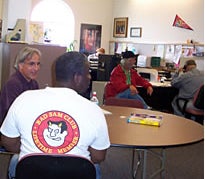The archives tell the nuts and bolts stories of mental health organizations and programs. Here are the letters, proposals, reports, flyers and brochures that explain how the PARTNERS program, the Village, Project Return, NAMI, and MHSA were conceived, developed and grew.
Choose Repository
- County of Los Angeles Department of Mental Health
- Hillview Mental Health Center
- Key California Legislation: AB 2034
- Key California Legislation: AB3777
- Key California Legislation: MHSA
- Mental Health Advocacy Services
- Mental Health America
- Mental Health America Connections Newsletters
- Mental Health Care in Los Angeles Before the County Department of Mental Health
- Mental Health Services 2001-2008
- Pacific Clinics
- PAS/California Alliance for the Mentally Ill (CAMI)
- Project Return
- Proposition 63
County of Los Angeles Department of Mental Health
Los Angeles County Department of Mental Health: Since first established in 1960, LAC-DMH has worked to provide effective mental health treatment and support services for the mentally ill in one of the largest and most diverse counties in the nation. As more patients were released from state hospitals, many to become part of the homeless and incarcerated populations, new programs had to be developed to provide housing and vocational rehabilitation, self-help and case management, treatment for mental disorders and co-occurring substance abuse, through directly operated and contract clinics. The struggle to balance the budget and make the best use of allocated funds has been ongoing. Since 2005, LAC-DMH has been working to implement MHSA programs effectively in all its clinics and to develop County plans, with Stakeholder input, for other MHSA components, such as Prevention and Early Intervention.
URL:
Hillview Mental Health Center
Hillview Mental Health Center was founded in 1966 as part of Pacoima Memorial Hospital and continued as an independent entity after the Hospital closed in 1984. Hillview provides services under contract with LAC-DMH, guided by Chief Executive Officer Eva McCraven and Chief Financial Officer Carl McCraven. It was among the first agencies in the County to develop Assertive Community Treatment and AB2034 programs, and the first mental health agency in the San Fernando Valley to develop permanent low-income supportive housing for adults with mental illness and specialized community housing for Transitional Age Youth with special needs.
| Attachment | Size |
|---|---|
| 2.17 MB | |
| 1.6 MB | |
| 1.79 MB | |
| 1.57 MB |
Key California Legislation: AB 2034
AB 2034, passed in 1999, funded demonstration programs to reduce homelessness among the mentally ill. Although the programs showed impressive successes, AB 2034 was defunded in 2008-2009 as a result of the recession and state budget crisis.
| Attachment | Size |
|---|---|
| 826.73 KB | |
| 961.08 KB | |
| 489.63 KB | |
| 164.9 KB | |
| 654.16 KB | |
| 424.09 KB | |
| 742.87 KB | |
| 261.56 KB | |
| 660.35 KB | |
| 1.31 MB |
Key California Legislation: AB3777
AB3777, the Wright-Bronzan-McCorquodale Act of 1988, funded three demonstration Integrated Service Agency programs for the mentally ill. The most well-known of these was MHA’s The Village in Long Beach, which became a model for MHSA.
| Attachment | Size |
|---|---|
| 2.95 MB | |
| 3.71 MB | |
| 5.69 MB |
Key California Legislation: MHSA
The Mental Health Services Act of 2005 was passed by California voters as Prop 63 in 2004 to expand the innovative service programs already begun in the state for the severely and persistently mentally ill. The State Department of Mental Health and the mental health advocates who wrote the legistlation saw the implementation of MHSA as requiring a “transformation” of the entire system to provide accessible, integrated, recovery-model services for this difficult population. New initiatives in prevention and early intervention, workforce training, and stigma reduction were also part of the legislation. Plans were to be developed with active stakeholder participation, including families and consumers, and outcomes monitored by a new Oversight and Accountability Commssion. To fund the new programs and services, the MHSA created a new revenue source for mental health services through a surcharge tax on incomes over $1 million. Although the legislation has had significant impact on programs and services throughout the state, budget shortfalls since the recession of 2008 have prevented realization of the planners’ vision for MHSA.
URL: https://mhsoac.ca.gov/sites/default/files/MHSA%20Jan2020_0.pdf
Mental Health Advocacy Services
Mental Health Advocacy Services in Los Angeles has worked since 1978 to provide legal representation and assistance for mental health clients.
Mental Health America
Mental Health America: First founded in 1909 by recovered mental health patient Clifford Beers, the national organization carries out educational, advocacy, and lobbying programs on behalf of the mentally ill. The Los Angeles County MHA has been particularly active and visible under the leadership of Rev. Richard Van Horn, Executive Director 1980-2009. Two of its most significant initiatives are the Village in Long Beach, an Integrated Service Agency Mental Health Center, opened in 1990 with state demonstration grant funds, and the Project Return Peer Support Network. MHA also played a major role in the development and passage of the Mental Health Services Act of 2005 (Proposition 63). www.mhala.org
URL:
| Attachment | Size |
|---|---|
| 1.89 MB | |
| 3.38 MB | |
| 2.37 MB | |
| 848.39 KB | |
| 45.39 KB | |
| 7.42 MB | |
| 8.94 MB |
Mental Health America Connections Newsletters
In the early 1980s, Mental Health America produced the Connections newsletter for the Los Angeles mental health community. Areta Crowell, Mental Health America, and Jim Preis donated issues of the newsletter to the archive.
Mental Health Care in Los Angeles Before the County Department of Mental Health
Before the creation of the Los Angeles County Department of Mental Health, mental health services were generally provided in state hospitals. In the 1950s, California also created a few outpatient clinics as well. Beyond these, Los Angeles County provided some of its own services for the mentally ill as far back as 1914. The 1957 Short-Doyle Act helped make it possible for the County to create a more comprehensive outpatient program, which was established with the creation of the Department of Mental Helath in 1960.
Mental Health Services 2001-2008
Data Reports on availability of beds and services in the early 2000s
| Attachment | Size |
|---|---|
| 586.31 KB | |
| 348.87 KB | |
| 1.05 MB | |
| 126.86 KB | |
| 190.03 KB | |
| 152.06 KB | |
| 211.54 KB | |
| 199.93 KB | |
| 359.28 KB | |
| 253.17 KB | |
| 201.14 KB | |
| 442.93 KB | |
| 532.85 KB |
Pacific Clinics
Originally founded as Pasadena Child Guidance Clinic in 1926, Pacific Clinics is now the largest contract provider of services for the mentally ill in Los Angeles County, as well as offering services in four neighboring counties. Under the leadership of executive director Susan Mandel since 1981, it offers programs for adults, children, transitional-age youth, adults and seniors. Pacific Clinics opened the first Asian-Pacific Family Center in 1985 and began an annual Latino Conference in 1998. In 2007, it merged with Portals, another major contract provider with a well-recognized track record in housing and vocational services.
URL:
| Attachment | Size |
|---|---|
| 1.64 MB | |
| 182.37 KB | |
| 6.29 MB | |
| 3.35 MB |
PAS/California Alliance for the Mentally Ill (CAMI)
In 1973, Eve Oliphant invited a few other parents of children diagnosed with schizophrenia to her home in San Mateo County, California. Within a year, this small meeting had become PAS, Parents of Adult Schizophrenics, a vocal and determined advocacy group led by Oliphant and Tony and Fran Hoffman. Their goals were better services, more research, and an end to stigma and discrimination against the mentally ill. By 1977, nine family groups had been organized in the area, and Don Richardson and Stella March in Los Angeles, as well as other family activists around California, joined a statewide meeting in Oakland. The larger organization named itself CAFMD, California Association of Families of the Mentally Disabled. In 1979, California leaders met with other concerned parents in Wisconsin and took the first steps toward forming the National Alliance for the Mentally Ill. CAFMD renamed itself CAMI in 1982.
Project Return
Project Return self-help clubs were started on the East Coast as a way for mental health clients to provide assistance and support to each other. The Los Angeles Project Return Network begain in 1981 under MHA’s umbrella and grew to more than 60 clubs across the county. In 1992, Project Return: The Next Step evolved from the original club network into a larger client-run organization which offers opportunities for education, employment counseling, and community service, as well as social interactions.
URL: http://prpsn.org/
Proposition 63
| Attachment | Size |
|---|---|
| 4.67 MB | |
| 114.67 KB | |
| 566.09 KB | |
| 1.2 MB |



